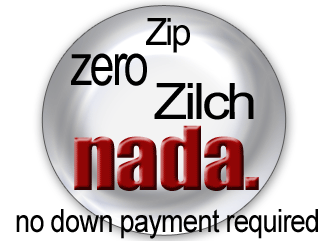


There are all sorts of home loan programs out there, including zero down, no down payment, or 100% financing mortgages. Buying a home without having to come up with a down payment (usually worth tens of thousands of dollars) sounds like a pretty nice deal. The question is: Is it really a safe mortgage loan? Will it put you at greater financial risk than a traditional loan plus down payment would? As with most things in life the answer is: it depends.
This type of loan program may or may not be a safe venture based on your personal financial circumstances and your motives for wanting a zero-down loan. A mortgage lender will evaluate your eligibility for a loan on the basis of your income, your credit rating, and your assets. In most cases, if you have sufficient income and a good credit score, then the down payment and assets becomes less important. In this case, a 100% financed loan may be no riskier than a traditional loan. Besides, any sane mortgage lender would not qualify you for a no-down payment loan if you did not have the means to make the higher payments. A person with a large income could use the money he would have put towards a down payment and invest it in retirement accounts or other funds. Basically, if you have a good income and credit score, go for it! You may be able to better use the saved money elsewhere in order to create wealth.
If, on the other hand, you are interested in a zero-down loan because you don't have the money for a down payment and it will be tough to afford a home anyway, financing 100% of your loan may be risky. Fortunately, with lending standards tightening up recently, there are few lenders who would actually qualify you for a zero-down loan unless you can truly afford the payments. If you need help with a down payment, you may want to consider down payment gift or grant programs. You may also be able to find a seller willing to pay your closing costs or gift you money for a down payment.
Another reason 100% financing may not be a safe loan if you are strapped for funds is that you will be required to pay private mortgage insurance (PMI) on top of your fees and monthly mortgage payments. This is insurance that protects the lender against any default on your part. You have to keep paying it until your equity reaches about 20% of the loan value.
Finally, even if you have a good income but you have poor credit, it may not be safe to go with a zero-down mortgage. Lenders generally look for a sizeable down payment in order to protect themselves from loss in the even that you default and go into foreclosure. If that should happen, they already have a good chunk of money from you that they can use to make up for any loss they incur by selling your home. If you do not put any money down and you have bad credit, you will be putting your lender and yourself at higher risk of loss. If the financial troubles or habits that have haunted you thus far continue after you get your mortgage, you may find yourself unable to make your mortgage payments. If you tried to sell your home to avoid foreclosure, you would have little or no equity in your house, meaning there would be little or no profit from the sale. If the market is sour, you may even sell at a loss and will have to repay your lender the remainder of the balance on your mortgage loan.
So the bottom line is: if you are a responsible, investment-savvy person with good credit and income, a zero-down loan may be a great choice. If you know you have poor credit and/or a limited income, consider staying away from 100% financing.
To Qualify for Zero Down Mortgage or for info Click Here
